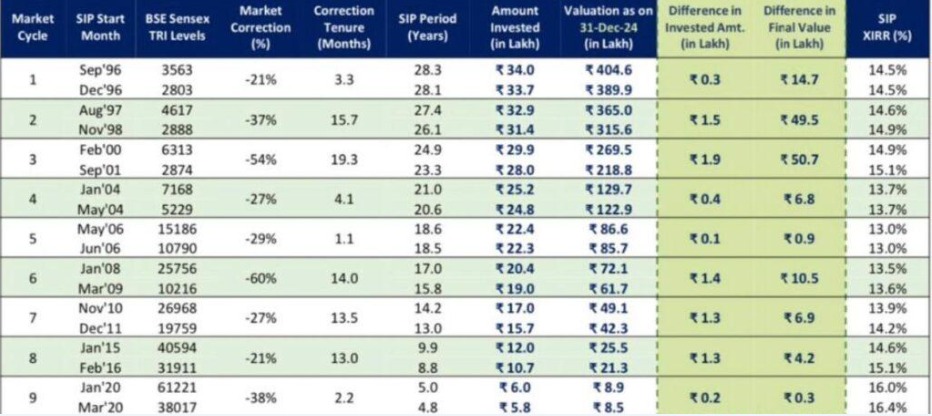The Power of SIPs: Why Staying Invested Through Market Cycles is Key

One of the most striking examples of market volatility is the dot-com bubble, which saw Indian markets experience a 54% correction over a grueling 19-month period. For investors, this period was marked by uncertainty, fear, and substantial losses. However, the story of a Systematic Investment Plan (SIP) investor during this time provides powerful insights into the benefits of disciplined, long-term investing—particularly during market corrections.

SIPs in Volatile Markets: A Case Study
Let’s consider two hypothetical SIP investors during the dot-com bubble and its aftermath:
Investor A started a monthly SIP of ₹25,000 at the very bottom of the market cycle in September 2001, when the correction ended and markets began their upward trajectory.
Investor B started the same ₹25,000 SIP at the peak of the market in February 2000, just before the 54% correction began.
Fast forward to December 2024, after both investors have consistently contributed to their SIPs.
Investor A would have invested ₹70 lakhs over 280 months, which would have grown to ₹5.5 crores based on actual market returns.
Investor B, who had the misfortune of starting at the peak, would have invested ₹74.75 lakhs over 299 months, but this would have grown to ₹6.7 crores—₹1.2 crores more than Investor A’s corpus.
This may seem counterintuitive at first, but it underscores a key principle of SIPs: they are designed to perform best in falling markets due to the power of rupee cost averaging.
Key Takeaways for Investors
Better Returns Despite Starting at the Top
The data clearly shows that starting an SIP at the top of a market cycle (just before a correction) can result in superior returns over the long term. This happens because SIPs allow you to buy more units when the market is down, thereby lowering your average purchase price. The lesson? Stopping your SIP during a falling market might deprive you of future gains. SIPs thrive in volatile conditions as they take advantage of lower market levels.
The Importance of Staying Invested Long-Term
Both examples highlight the importance of a long-term investment horizon. Investor A and Investor B achieved significant returns because they stayed invested for over 25 years. The power of compounding and market recovery are critical factors in wealth creation. SIPs, when held over decades, can smooth out short-term volatility and deliver robust returns.
Emotional Discipline in Market Corrections
Market corrections are inevitable. In the last 28 years, Indian markets have experienced at least nine instances where they corrected by more than 20%. Each time, investors who stayed the course and continued their SIPs during these downturns came out ahead. The key challenge for investors is emotional discipline. It’s easy to get swayed by fear during market crashes, but staying invested and even increasing your contributions during such times can significantly enhance long-term returns.
Conclusion: SIPs as a Tool for Long-Term Wealth Creation
The story of the dot-com bubble serves as a compelling reminder of the effectiveness of SIPs, especially during turbulent times. Instead of attempting to time the market, SIP investors benefit from consistency and discipline. The rupee cost averaging mechanism ensures that you buy more when prices are low, which over time leads to better returns.
For investors with a long-term perspective and the emotional discipline to stay invested during market corrections, SIPs offer an unparalleled opportunity to build substantial wealth. As history has shown, markets may fall, but they always recover—and those who stay the course reap the rewards.
Research Credits: Sri Subhash Yerneni
Best Regards
Sri Subhash Yerneni,
Founder,
Vika Wealth.
- Feb 12, 2025
Family Office | Estate Planning | Tax Services | ESOP Advisory | Company Incorporations | Mutual Funds | PMS | Bonds | AIF | Offshore Investing | Private Equity and Venture Capital Funds
Disclaimer: All the above views are for educational purposes and are not given as investment advice.
Subscribe To Our Blogs
About Author

Sri Subhash Yerneni
Sri Subhash is an astute banking and finance professional with 14 years of real-world experience in wealth management, advisory of financial instruments such as mutual funds-equity and debt-alternate investment funds ( AIF)-structure and offshore products-private equity-venture capital/debt-bonds and MLDs-priority banking-cash management-team management-and working with various cultures in various nations.
Recent Blogs
Quick Links
Services
Services
Contact Info
3rd Floor, Plot No. 55/A, Rd No 52, BNR Hills, Jubilee Hills, Rai Durg, Hyderabad - 500081
Copyright © 2025 VIKA WEALTH – All Rights Reserved.
Quick Links
Services
Contact Info
3rd Floor, Plot No. 55/A, Rd No 52, BNR Hills, Jubilee Hills, Rai Durg, Hyderabad - 500081
Copyright © 2025 VIKA WEALTH – All Rights Reserved.












